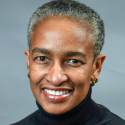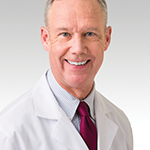
Dr. Kerr
Dr. Kerr: Thinking back to medical school at the University of the West Indies, I must give all of the accolades in the world to my medical school faculty and teachers. They were all extremely skilled clinicians, with a wide breadth of knowledge; even the musculoskeletal exam of the knee was first taught to me by a nephrologist. I was trained by cardiologists to detect an atrial septal defect just from the physical exam and clinical history. I was given the foundation of looking, listening, feeling and touching. Sir George Alleyne, MD, FRCP, FACP (Hon.), DSc (Hon.), was one specific role model of mine in medical school.
At the VA, we have excellent clinicians with regards to soft tissue rheumatism, and we do a lot of touching and feeling when it comes to the joints and in conditions such as rheumatoid arthritis. David Nashel, MD, at the VA, is someone I greatly admire.
TR: What are some habits a fellow in training or junior rheumatologist can incorporate into their daily practice to build on their skills as a clinician?
Dr. Kerr: I teach young trainees to always disrobe the patient and take time to examine the patient completely.
I push them more and more to place themselves in the life of a patient for a day. We know what treatments to use, but when the patient returns and hasn’t improved, we must ask, ‘Why is it so?’ We must see if they did not have the money to pay for their medication or could not come to clinic because they could not afford bus fare.
When you are young, you have often not experienced a medical disease, and it is important to understand how the patient feels. Sometimes an extra minute spent understanding the patient’s point of view means so much.
TR: What are the specific areas of triumph and challenges faced by women and minority physicians seeking to become leading clinicians in the field of rheumatology, and in medicine in general?
Dr. Kerr: My personality is to make sure we are respected even on rounding. Often, with a female attending rounding with a male fellow, the staff reflexively looks at the male fellow. This is doubly true for me due to ethnicity, as well. You know that you know your subject matter, and eventually, the eyes will turn to you when you demonstrate your knowledge and skill.
In the Caribbean, many women are in leadership roles. Most of the university graduates are women, and although, subconsciously, there may still exist certain gender-specific ideas, the social structure is different. We must aspire to maintain our role as providers of care and also work to improve the system around us.


